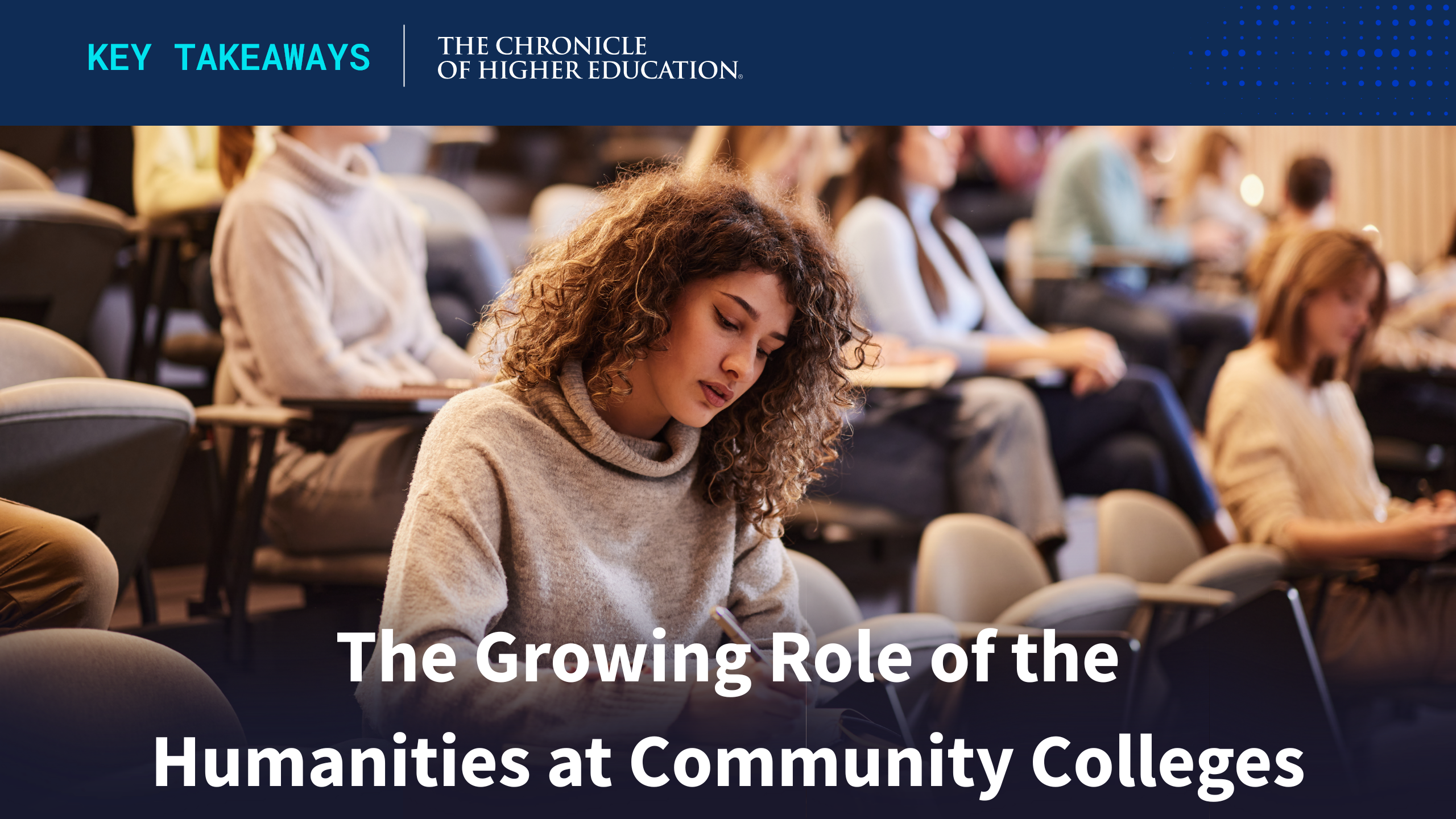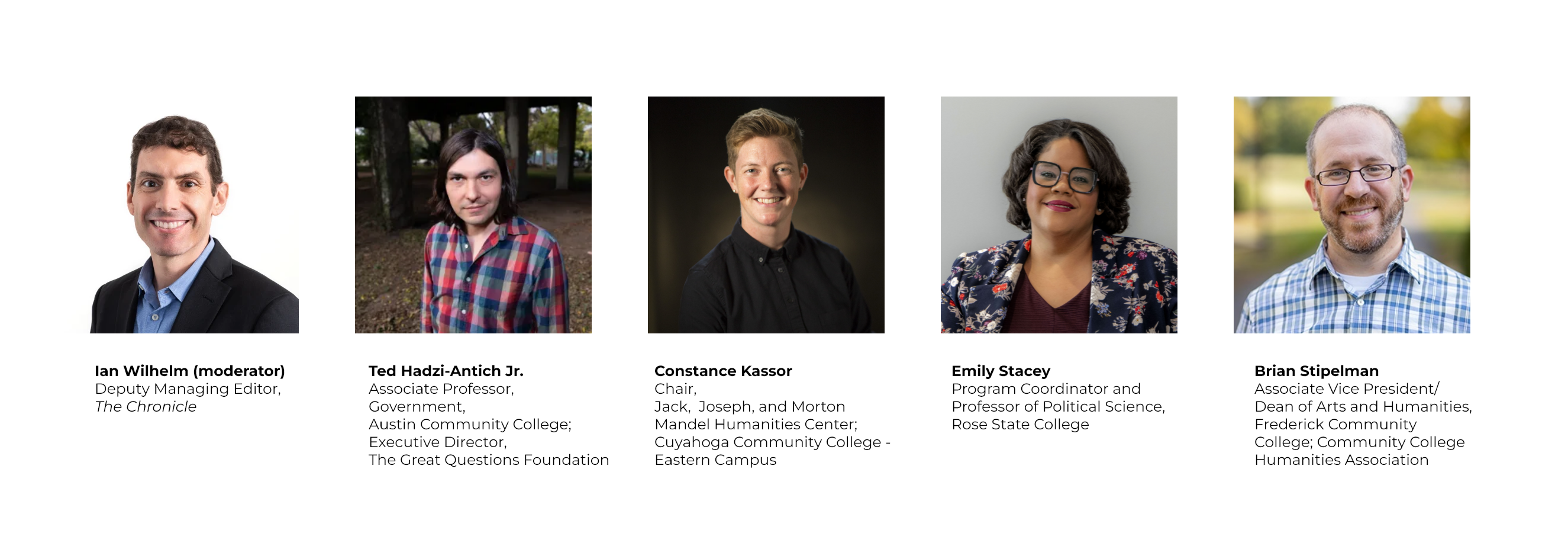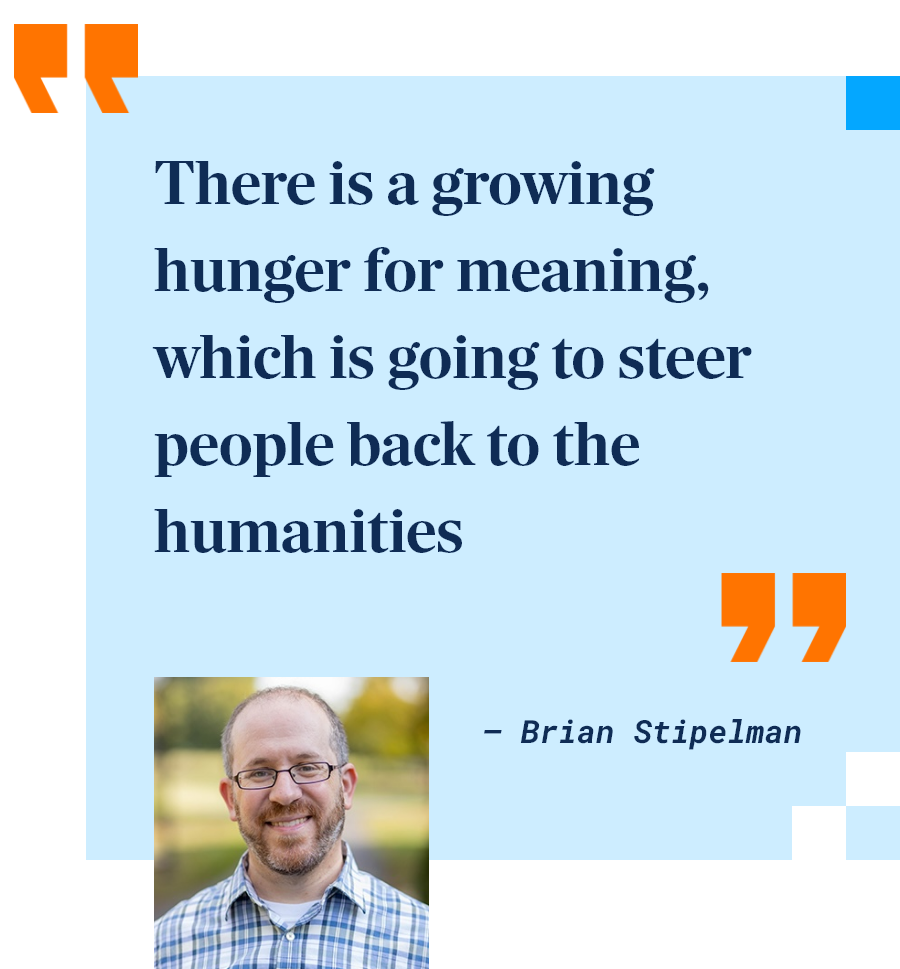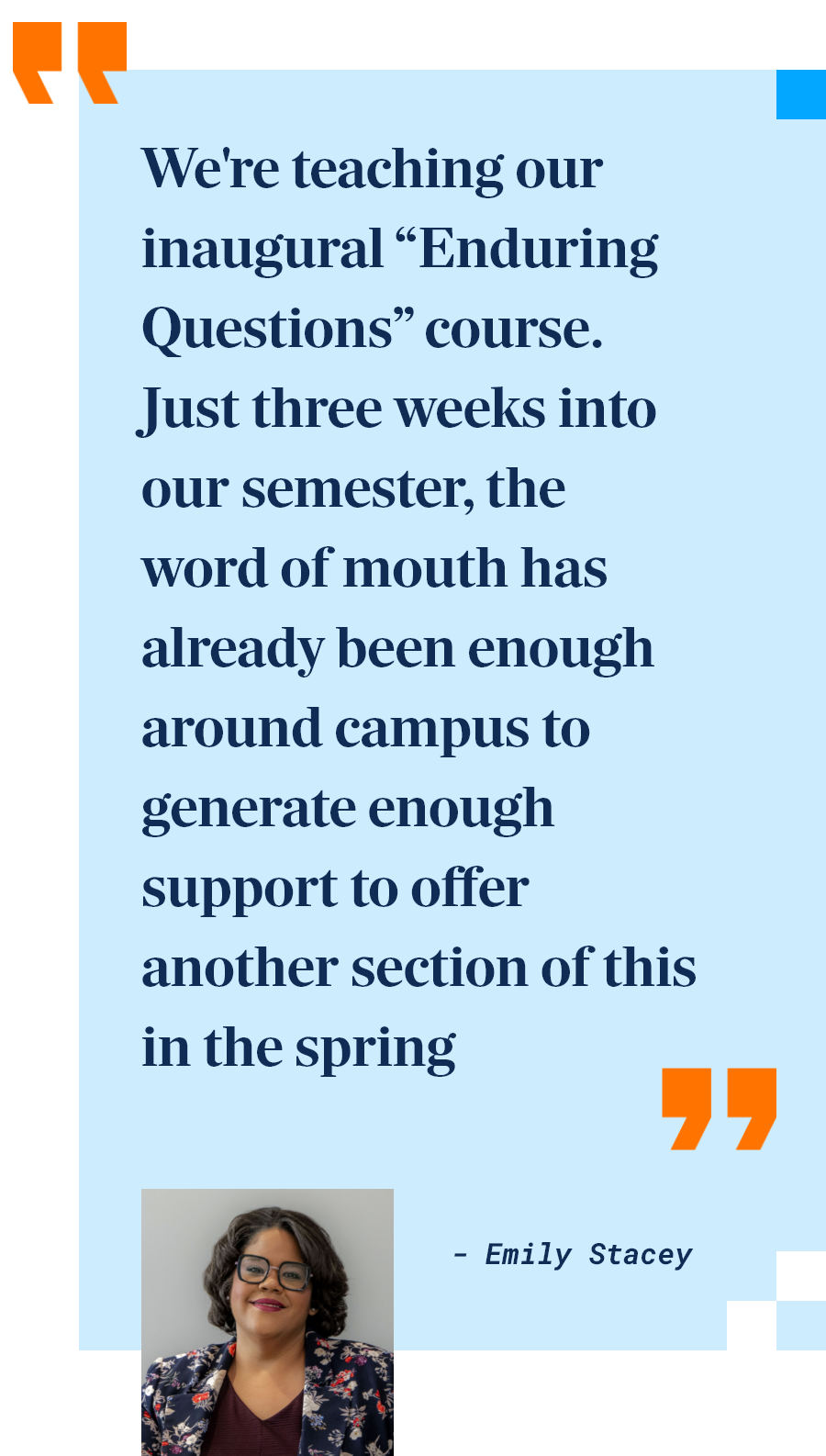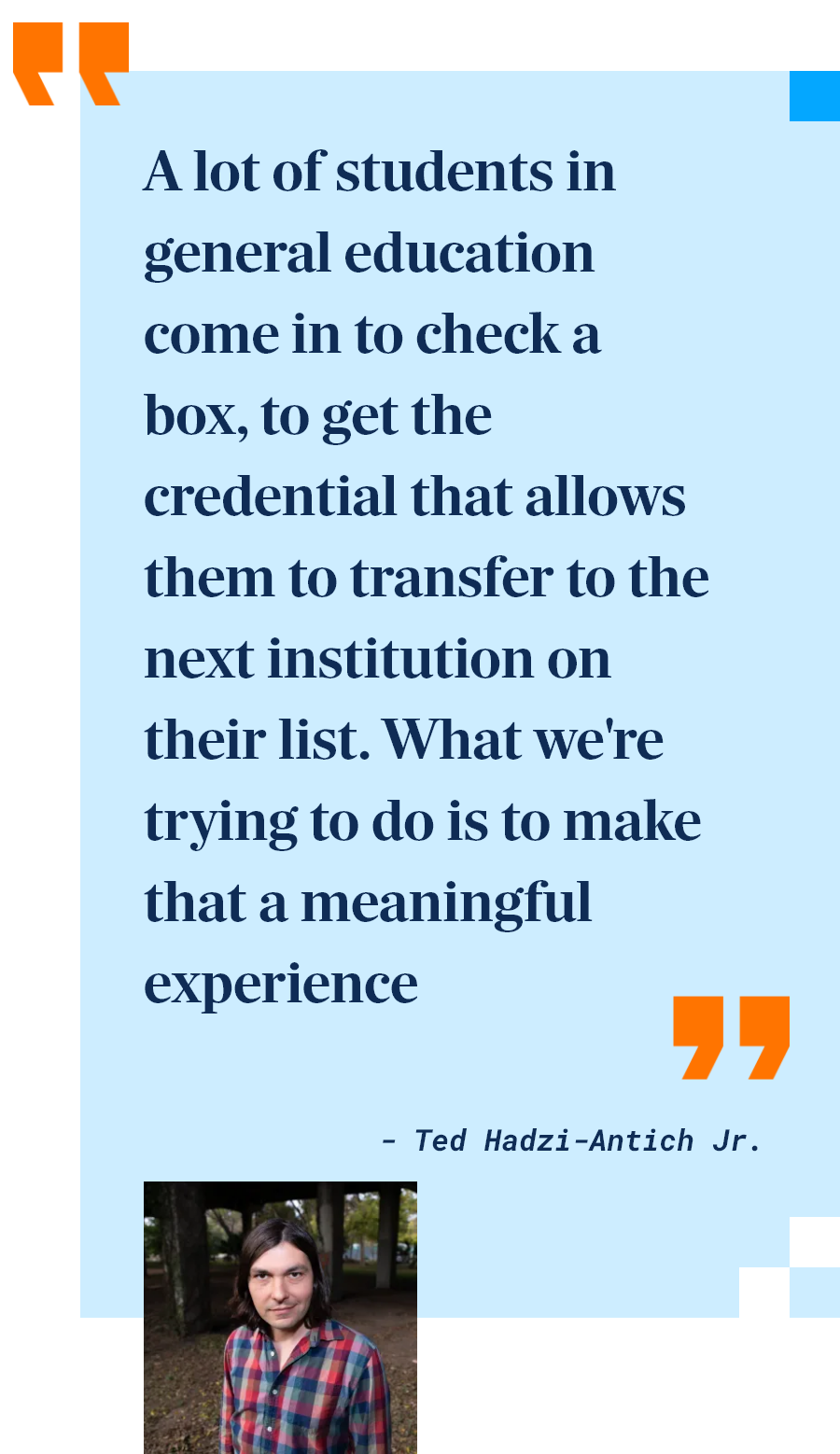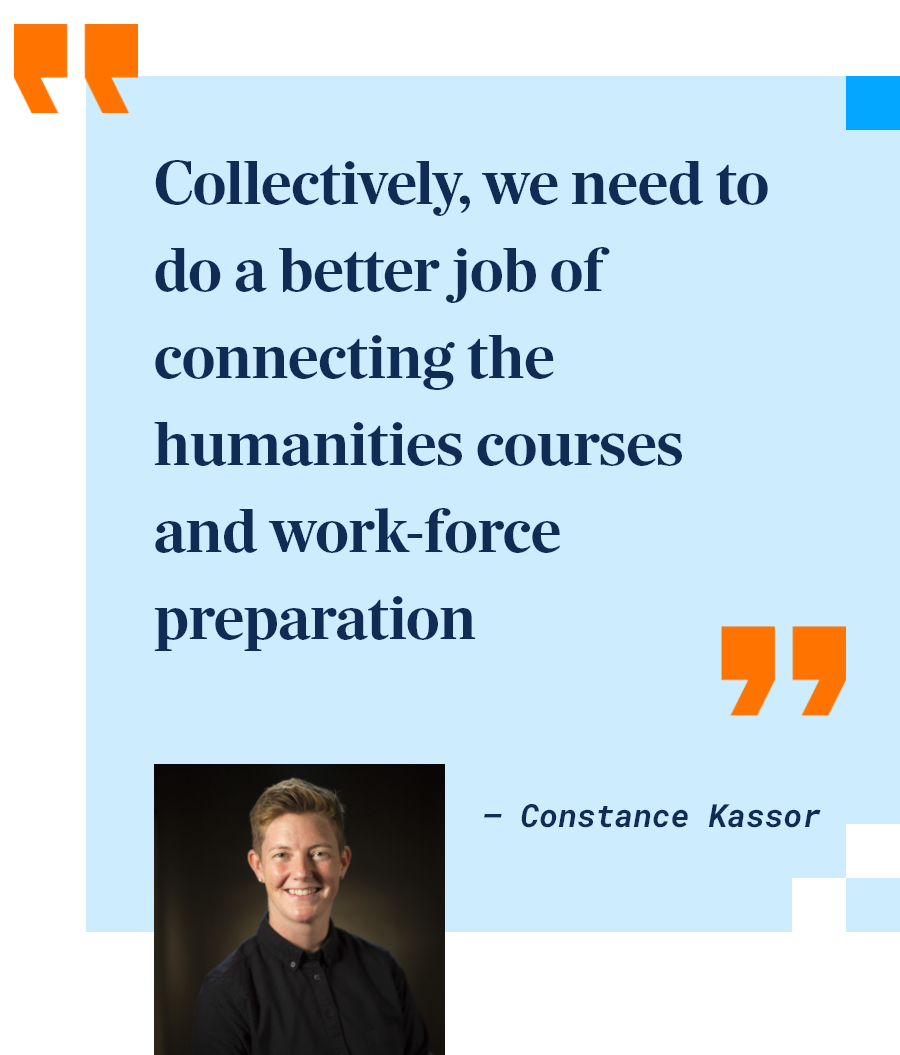The humanities are in crisis — or so the prevailing narrative goes. As some politicians wage ideological attacks, others claim the humanities lack vocational relevance, particularly with the rise of generative AI. And these are just the latest headwinds.
In the wake of the Great Recession, student interest moved away from the humanities toward degrees that they believed would yield better career outcomes. The American Academy of Arts and Sciences’ Humanities Indicators project found that the number of bachelor’s degrees awarded in humanities over the following decade decreased 24 percent, while STEM fields saw substantial growth.
Yet a counternarrative is emerging: a resurgence in the humanities at community colleges. With more students enrolling in liberal-arts courses at two-year institutions, some argue the primary function of community colleges has shifted from vocational education to liberal education.
To learn more about why the humanities may be thriving at community colleges, how such courses may need more support and attention, and what the future may look like for those academic programs, The Chronicle held a virtual forum, “The Growing Role of the Humanities at Community Colleges.” The following comments, edited for clarity and length, represent key takeaways from the forum. To hear the full discussion, watch the recording here.
Ian Wilhelm: What is the state of the humanities at community colleges? There are a lot of nuances to that answer, a lot of caveats, because it depends on where you are, the mission of your institution, certainly the state and regional politics, as well.
Brian Stipelman: There’s good news and there’s bad news. I’ll start with the bad news. It’s a complex and challenging time, even just beyond the normal questioning in some circles about what the value of the humanities is. There was an article in Inside Higher Ed this morning about two Texas A&M administrators [who were removed from their posts] and a professor who was fired because a student filmed a professor teaching content in a children’s literature class that allegedly violated one of President Trump’s executive orders. This is a risky moment for anybody working in a college, but especially in states where the culture wars have crossed over into higher ed, whether that reflects authentic public opinion, or is an outgrowth of state and national politics.
This is going to be exacerbated in the humanities. Any exploration of what it means to be human is by nature going to be at risk of getting challenged by a cramped and limited understanding of who gets to constitute humanity. And post-Covid, there have been significant restrictions on community-college faculty funding for travel, for research.
But despite all that, I’m optimistic about the position of the humanities. I think in the next 10 years or so, we’re going to see a fairly sizable surge, for two reasons. One, we live in a profoundly alienated age, which there are many reasons for, but there is a growing hunger for meaning, which is going to steer people back to the humanities.
AI is gonna start to shift higher ed away from the process work that came to define a lot of sectors during the big career push of the last 15 years or so, and back toward a background that enables people to engage in critical, imaginative, expansive humanistic thinking.
Community colleges are going to be absolutely central, because this is usually the largest sector of students in the country. In any given year, 35 to 45 percent of the students in higher ed are in community colleges. So how students are exposed to the humanities at community colleges is going to be essential, especially because for career students and for people who are transferring in programs outside of the humanities, what they get at the community college may be their only humanities exposure.
Ian Wilhelm: What is the state of the humanities at community colleges? There are a lot of nuances to that answer, a lot of caveats, because it depends on where you are, the mission of your institution, certainly the state and regional politics, as well.
Brian Stipelman: There’s good news and there’s bad news. I’ll start with the bad news. It’s a complex and challenging time, even just beyond the normal questioning in some circles about what the value of the humanities is. There was an article in Inside Higher Ed this morning about two Texas A&M administrators [who were removed from their posts] and a professor who was fired because a student filmed a professor teaching content in a children’s literature class that allegedly violated one of President Trump’s executive orders. This is a risky moment for anybody working in a college, but especially in states where the culture wars have crossed over into higher ed, whether that reflects authentic public opinion, or is an outgrowth of state and national politics.
This is going to be exacerbated in the humanities. Any exploration of what it means to be human is by nature going to be at risk of getting challenged by a cramped and limited understanding of who gets to constitute humanity. And post-Covid, there have been significant restrictions on community-college faculty funding for travel, for research.
But despite all that, I’m optimistic about the position of the humanities. I think in the next 10 years or so, we’re going to see a fairly sizable surge, for two reasons. One, we live in a profoundly alienated age, which there are many reasons for, but there is a growing hunger for meaning, which is going to steer people back to the humanities.
AI is gonna start to shift higher ed away from the process work that came to define a lot of sectors during the big career push of the last 15 years or so, and back toward a background that enables people to engage in critical, imaginative, expansive humanistic thinking.
Community colleges are going to be absolutely central, because this is usually the largest sector of students in the country. In any given year, 35 to 45 percent of the students in higher ed are in community colleges. So how students are exposed to the humanities at community colleges is going to be essential, especially because for career students and for people who are transferring in programs outside of the humanities, what they get at the community college may be their only humanities exposure.
Wilhelm: What’s the state of the humanities at your institution? How are you thinking about making sure it continues to thrive, if it is?
Constance Kassor: We are fortunate to have a very generous scholarship program attached to some areas of study that connect to the humanities. One of the requirements of our scholarship program is they have to focus on the humanities, and they learn about leadership and civic engagement. But the programming is open to everybody, so students who are studying business, nursing, or whatever it is — they can still do that, but they’re also getting those humanities-based classes, and they’re getting access to co-curricular programming.
What’s really interesting is a lot of students come to take these classes, or they do these activities, because we tell them, well, that’s part of your scholarship. But those students end up becoming some of our biggest advocates for the humanities, because they see the value in what they’re studying, how that connects to their growth as a leader, how that connects to their engagement in the community.
Emily Stacey: In Oklahoma you must complete an American federal government course, regardless of your degree program. That’s a great thing. Beyond degree requirements at Rose, many of my colleagues in the liberal-arts and sciences division have started collaborating on course redesigns for our general-education courses. We’re remaking perfunctory, required general-education courses, from textbook and multiple-choice-based courses to discourse- and literature-centered classes.
The students are responding in incredible ways. We’re teaching our inaugural “Enduring Questions” course, the foundation of this embedded certificate in our social-sciences degree program. We’re having students engage with works from Herodotus to Foucault, Baldwin to the Bible. The word of mouth has been incredible — just three weeks into our semester, the word of mouth has already been enough around campus to generate enough support to offer another section of this in the spring — which I was not anticipating.
As over-publicized as the Oklahoma political environment is, it is not nearly as egregious as the national media would put it. So we’re still keeping on, and we’ve got good support for the humanities and civic education here in the state.
Wilhelm: What’s the state of the humanities at your institution? How are you thinking about making sure it continues to thrive, if it is?
Constance Kassor: We are fortunate to have a very generous scholarship program attached to some areas of study that connect to the humanities. One of the requirements of our scholarship program is they have to focus on the humanities, and they learn about leadership and civic engagement. But the programming is open to everybody, so students who are studying business, nursing, or whatever it is — they can still do that, but they’re also getting those humanities-based classes, and they’re getting access to co-curricular programming.
What’s really interesting is a lot of students come to take these classes, or they do these activities, because we tell them, well, that’s part of your scholarship. But those students end up becoming some of our biggest advocates for the humanities, because they see the value in what they’re studying, how that connects to their growth as a leader, how that connects to their engagement in the community.
Emily Stacey: In Oklahoma you must complete an American federal government course, regardless of your degree program. That’s a great thing. Beyond degree requirements at Rose, many of my colleagues in the liberal-arts and sciences division have started collaborating on course redesigns for our general-education courses. We’re remaking perfunctory, required general-education courses, from textbook and multiple-choice-based courses to discourse- and literature-centered classes.
The students are responding in incredible ways. We’re teaching our inaugural “Enduring Questions” course, the foundation of this embedded certificate in our social-sciences degree program. We’re having students engage with works from Herodotus to Foucault, Baldwin to the Bible. The word of mouth has been incredible — just three weeks into our semester, the word of mouth has already been enough around campus to generate enough support to offer another section of this in the spring — which I was not anticipating.
As over-publicized as the Oklahoma political environment is, it is not nearly as egregious as the national media would put it. So we’re still keeping on, and we’ve got good support for the humanities and civic education here in the state.
Ted Hadzi-Antich Jr.: I want to pick up on transforming the general-education experience as a strategy to promote the humanities, because that’s really how the “Great Questions” course came to be. [We took] a required student-success requirement — a first-year seminar that everybody has to take — and tried to create an alternative curriculum that’s grounded in the discussion-based study of transformative texts and ideas. To get students to understand higher education as not just a prerequisite for economic security, but also as an essential part of helping them envision a good life.
Because our students are coming to us for that, even if they’re not articulating that. As public institutions, community colleges have a responsibility above career preparation. It’s to help our students develop as individuals, as members of our communities, to help them envision what a good life is for themselves.
There has been very little attention until recently on what is happening at the general-education level. That’s the place to focus, that’s the place where the humanities has a lot to add. A lot of students in general education come in to check a box, to get the credential that allows them to transfer to the next institution on their list. What we’re trying to do, people that support the humanities of community colleges, is to make that a meaningful experience.
We’ve had over 4,000 students go through our “Great Questions” seminar. About as many go through our “Great Questions Journey” classes, which are a redesigned course in the core curriculum. This year, we’re starting a new initiative called LEAD, Liberal Education Advancement and Development. We’re bringing together faculty that teach in a number of different liberal-arts programs, and in biology, mathematics, and in STEM, to come together to work in communities of practice to think about how we can make our general-education classes more meaningful.
Our ultimate goal is to design a first year of classes that are infused with these humanistic elements to make community-college general education the liberal education that this country needs right now. Because we are doing a bad job of talking to each other across differences, and there’s no better place to develop those skills than in the most diverse American space in the country today, which is a community-college general-education classroom.
Stipelman: We’re not going to necessarily turn nurses into philosophers, but we could make sure that nurses are exposed to philosophy. The general-education moment is when they’re going to get exposed, so making sure that those classes are as substantive, as rich, as purposeful as possible, is important.
Ted Hadzi-Antich Jr.: I want to pick up on transforming the general-education experience as a strategy to promote the humanities, because that’s really how the “Great Questions” course came to be. [We took] a required student-success requirement — a first-year seminar that everybody has to take — and tried to create an alternative curriculum that’s grounded in the discussion-based study of transformative texts and ideas. To get students to understand higher education as not just a prerequisite for economic security, but also as an essential part of helping them envision a good life.
Because our students are coming to us for that, even if they’re not articulating that. As public institutions, community colleges have a responsibility above career preparation. It’s to help our students develop as individuals, as members of our communities, to help them envision what a good life is for themselves.
There has been very little attention until recently on what is happening at the general-education level. That’s the place to focus, that’s the place where the humanities has a lot to add. A lot of students in general education come in to check a box, to get the credential that allows them to transfer to the next institution on their list. What we’re trying to do, people that support the humanities of community colleges, is to make that a meaningful experience.
We’ve had over 4,000 students go through our “Great Questions” seminar. About as many go through our “Great Questions Journey” classes, which are a redesigned course in the core curriculum. This year, we’re starting a new initiative called LEAD, Liberal Education Advancement and Development. We’re bringing together faculty that teach in a number of different liberal-arts programs, and in biology, mathematics, and in STEM, to come together to work in communities of practice to think about how we can make our general-education classes more meaningful.
Our ultimate goal is to design a first year of classes that are infused with these humanistic elements to make community-college general education the liberal education that this country needs right now. Because we are doing a bad job of talking to each other across differences, and there’s no better place to develop those skills than in the most diverse American space in the country today, which is a community-college general-education classroom.
Stipelman: We’re not going to necessarily turn nurses into philosophers, but we could make sure that nurses are exposed to philosophy. The general-education moment is when they’re going to get exposed, so making sure that those classes are as substantive, as rich, as purposeful as possible, is important.
Wilhelm: A viewer asks, how can we help our administrators buy into the idea that the humanities are just as important to promote as work-force development?
Kassor: We need to get away from this dichotomy that there are certain classes that you take that prepare you for careers, and certain classes that don’t. If we think about an engineer or a nurse, they’re obviously going to learn important skills in physics class, in biology class. But the graduates of those engineering or nursing programs who are going to succeed in their careers are the ones who also know how to work with others, who know how to think broadly, who can understand and appreciate different perspectives — all these skills that you get from your humanities classes. Collectively, we need to do a better job of connecting the humanities courses and work-force preparation. It’s not in addition to your real work-force preparation, but it’s actually an essential component of work-force preparation.
Wilhelm: What do you emphasize in conversations with the administration to build support within your institution for the humanities programs?
Stacey: We’re not soft skills. We’re providing incredibly important services and imparting knowledge that these students are going to be using for the rest of their lives. It’s really important to note that we’re having to re-socialize these kids from the Covid pandemic. These kids are anxious to speak to us as professors, much less one another, and so providing spaces for discourse and providing those general-education options, are providing spaces for them to explore themselves, and ideas in a meaningful way.
We’re seeing a decline in reading. So the skills that we’re imparting are more critical now than ever. People can’t keep jobs in STEM, they can’t code, they can’t program, they can’t be nurses, if they can’t read or write, or think critically, or appreciatively, or be able to recognize and engage in participatory citizenship, in democracy. And these are the things that we’re doing.
Wilhelm: A viewer asks, how can we help our administrators buy into the idea that the humanities are just as important to promote as work-force development?
Kassor: We need to get away from this dichotomy that there are certain classes that you take that prepare you for careers, and certain classes that don’t. If we think about an engineer or a nurse, they’re obviously going to learn important skills in physics class, in biology class. But the graduates of those engineering or nursing programs who are going to succeed in their careers are the ones who also know how to work with others, who know how to think broadly, who can understand and appreciate different perspectives — all these skills that you get from your humanities classes. Collectively, we need to do a better job of connecting the humanities courses and work-force preparation. It’s not in addition to your real work-force preparation, but it’s actually an essential component of work-force preparation.
Wilhelm: What do you emphasize in conversations with the administration to build support within your institution for the humanities programs?
Stacey: We’re not soft skills. We’re providing incredibly important services and imparting knowledge that these students are going to be using for the rest of their lives. It’s really important to note that we’re having to re-socialize these kids from the Covid pandemic. These kids are anxious to speak to us as professors, much less one another, and so providing spaces for discourse and providing those general-education options, are providing spaces for them to explore themselves, and ideas in a meaningful way.
We’re seeing a decline in reading. So the skills that we’re imparting are more critical now than ever. People can’t keep jobs in STEM, they can’t code, they can’t program, they can’t be nurses, if they can’t read or write, or think critically, or appreciatively, or be able to recognize and engage in participatory citizenship, in democracy. And these are the things that we’re doing.
This Key Takeaways was produced by Chronicle Intelligence. Please contact CI@chronicle.com with questions or comments.
©2025 by The Chronicle of Higher Education Inc. All rights reserved. This material may not be reproduced without prior written permission of The Chronicle. For permission requests, contact us at copyright@chronicle.com.


